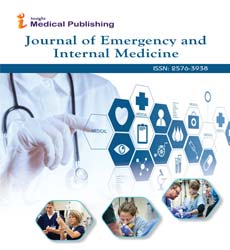ISSN : 2576-3938
Journal of Emergency and Internal Medicine
General Description of Internal and Veterinary Medicine
Mbaga Kalla*
Department of Pharmacy, Muhimbili University, Dares Salaam, Tanzania
- *Corresponding Author:
- Mbaga Kalla
Department of Pharmacy,
Muhimbili University,
Dares Salaam,
Tanzania,
E-mail: mbgak12@gmail.com
Received Date: September 7, 2021; Accepted Date: September 21, 2021; Published Date: September 28, 2021
Citation: Kalla M (2021) General Description of Internal and Veterinary Medicine. J Emerg Intern Med Vol.5 No.5:e004.
Description
Internal medicine, often known as general internal medicine in Commonwealth countries, is a medical speciality that focuses on the prevention, diagnosis, and treatment of disorders of the internal organs. Internists, or doctors (without a qualifier) in Commonwealth countries, are internal medicine specialists. Internists are experts in treating patients with undifferentiated or multi-system illness processes. Internists provide treatment to both hospitalised and ambulatory patients, as well as education and research. In Commonwealth countries, internal medicine and family medicine are sometimes mistaken as synonyms.
Internists spend a lot of time in hospitals since their patients are typically critically unwell or require sophisticated examinations. Internists frequently specialise on illnesses that affect specific organs or organ systems. Clinical pharmacy and veterinary medicine both have specialties in internal medicine. Veterinary medicine, often known as veterinary science, is a medical speciality that deals with the prevention, management, diagnosis, and treatment of illnesses that impact the health of domestic and wild animals, as well as the prevention of disease transmission from animals to humans.
Veterinary medicine is the area of medicine that deals with animal illness, disorder, and injury prevention, control, diagnosis, and treatment. Aside from that, it deals with animal husbandry, breeding, nutrition research, and product creation. Veterinary medicine covers a vast range of animal species, both domesticated and wild, as well as a wide range of diseases that can affect them.
Veterinary medicine is extensively performed, both under professional supervision and without it. A veterinary physician (also known as a veterinarian, veterinary surgeon, or "vet") is in charge of professional treatment; however Para veterinary professionals such as veterinary nurses and technicians also play a role. Other paraprofessionals with specialised specialisations, such as animal physiotherapy or dentistry, and species-specific responsibilities, like as farriers, can supplement this and Veterinary science contributes to human health through monitoring and controlling zoonotic illness (infectious disease transferred from nonhuman animals to people), as well as indirectly through basic medical research applications. They also contribute to the food supply by monitoring and treating livestock, as well as mental health by keeping pets healthy and long-lived. Depending on the nature of study, veterinary scientists frequently interact with epidemiologists and other health or natural scientists. Veterinarians are typically required by law to look after the welfare of animals. Veterinarians diagnose, treat, and care for animals in order to keep them safe and healthy.
A board-certified veterinary internal medicine specialist is a licenced veterinarian who has received extra training in understanding how your pet’s internal body systems work, as well as detecting and treating the numerous serious illnesses that can impact those systems' health. Internal medicine specialists have completed advanced training in the following areas:
• Endocrinology
• Cardiology
• Gastroenterology
• Haematology is the study of blood (study of the blood)
• Immunology
• Viruses and Infectious Diseases
• Nephrology/Urology
• Neurology
• Diseases of the Lungs
• Oncology
A veterinarian who has completed extra study in internal medicine and has been recognised by the American College of Veterinary Internal Medicine is known as a board certified veterinary internal medicine specialist (DACVIM). This certification requires extensive training and study in the following areas: A veterinary degree is required (three to four years of undergraduate college, followed by four years of veterinary school).
• Internship in veterinary medicine and surgery for one year.
• Advanced internal medicine training for three years (residency).
• A set of in-depth exams that cover every element of internal medicine.
Open Access Journals
- Aquaculture & Veterinary Science
- Chemistry & Chemical Sciences
- Clinical Sciences
- Engineering
- General Science
- Genetics & Molecular Biology
- Health Care & Nursing
- Immunology & Microbiology
- Materials Science
- Mathematics & Physics
- Medical Sciences
- Neurology & Psychiatry
- Oncology & Cancer Science
- Pharmaceutical Sciences
